149 start with T start with T

Prime minister of Sweden and leader of the Social Democratic party from 1946-1969, Tage Erlander enjoyed a career that was remarkable both for its major accomplishments and longevity. Under his leadership, Sweden became an exemplary welfare state following World War II. Universal pensions, child support, health insurance, extended paid vacations, subsidized housing, and many other benefits made Sweden's standard of living the envy of the world.
This definitive political biography is both the study of an individual style of leadership and the role of the prime minister in a parliamentary state. It shows Erlander as a complex and engaging intellectual fiercely loyal to his party, agitative yet dedicated to cooperation between parties.
Olof Ruin analyzes Erlander's various roles as Riksdag caucus leader, cabinet organizer, party leader, promoter of domestic consensus, and foreign policy maker. Ruin is the first scholar to be given unrestricted access to Erlander's diaries.
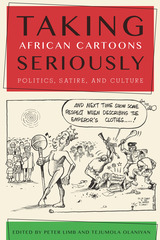

Drawing on unpublished presidential papers and other archival sources, Castile chronicles the efforts of three presidents to uphold Richard Nixon’s commitment to policy change, weighing such issues as the impact of Reaganomics and the advent of Indian gaming. He examines the marginalizing of Indian policy in both the executive and legislative branches in the face of larger issues, as well as the recurring tendency of policy to be driven by a single determined individual, such as South Dakota senator James Abourezk. Although self-determination is roundly advocated by all concerned with federal Indian policy, until now no book has provided a grasp of both its background and its implications. Taking Charge is an essential contribution to the critical study of that policy that allows a better understanding of contemporary Indian affairs.

Taking the Initiative shows that majority party leaders in Congress have set and successfully pushed their own policy agendas for decades—revealing the 'Contract With America' as only the most recent, and certainly not the most successful, example of independent policy making.
Cutting deeply into the politics and personalities of three decades of party leadership, John B. Bader probes the strategies and evaluates the effectiveness of House and Senate leaders operating in a divided government, when Congress and the presidency are controlled by different political parties. He provides a historical context for analyzing the"Contract" and shows that aggressive agenda-setting has long been a regular feature of majority party leadership.
Bader interviewed more than seventy congressional leaders, staff members, party officials, and political consultants, including speakers Thomas "Tip" O'Neill and Jim Wright, for this book. He supplemented these interviews with research in largely unexplored archival materials such as press conference transcripts, notes from White House leadership meetings, and staff memoranda on strategy.

The cocreator of the Washington Post’s “Made by History” blog reveals how the rise of conservative talk radio gave us a Republican Party incapable of governing and paved the way for Donald Trump.
America’s long road to the Trump presidency began on August 1, 1988, when, desperate for content to save AM radio, top media executives stumbled on a new format that would turn the political world upside down. They little imagined that in the coming years their brainchild would polarize the country and make it nearly impossible to govern. Rush Limbaugh, an enormously talented former disc jockey—opinionated, brash, and unapologetically conservative—pioneered a pathbreaking infotainment program that captured the hearts of an audience no media executive knew existed. Limbaugh’s listeners yearned for a champion to punch back against those maligning their values. Within a decade, this format would grow from fifty-nine stations to over one thousand, keeping millions of Americans company as they commuted, worked, and shouted back at their radios. The concept pioneered by Limbaugh was quickly copied by cable news and digital media.
Radio hosts form a deep bond with their audience, which gives them enormous political power. Unlike elected representatives, however, they must entertain their audience or watch their ratings fall. Talk radio boosted the Republican agenda in the 1990s, but two decades later, escalation in the battle for the airwaves pushed hosts toward ever more conservative, outrageous, and hyperbolic content.
Donald Trump borrowed conservative radio hosts’ playbook and gave Republican base voters the kind of pugnacious candidate they had been demanding for decades. By 2016, a political force no one intended to create had completely transformed American politics.
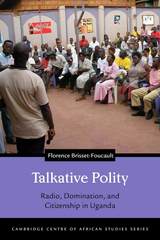
For the first decade of the twenty-first century, every weekend, people throughout Uganda converged to participate in ebimeeza, open debates that invited common citizens to share their political and social views. These debates, also called “People’s Parliaments,” were broadcast live on private radio stations until the government banned them in 2009. In Talkative Polity, Florence Brisset-Foucault offers the first major study of ebimeeza, which complicate our understandings of political speech in restrictive contexts and force us to move away from the simplistic binary of an authoritarian state and a liberal civil society.
Brisset-Foucault conducted fieldwork from 2005 to 2013, primarily in Kampala, interviewing some 150 orators, spectators, politicians, state officials, journalists, and NGO staff. The resulting ethnography invigorates the study of political domination and documents a short-lived but highly original sphere of political expression. Brisset-Foucault thus does justice to the richness and depth of Uganda’s complex political and radio culture as well as to the story of ambitious young people who didn’t want to behave the way the state expected them to. Positioned at the intersection of media studies and political science, Talkative Polity will help us all rethink the way in which public life works.

Honest, objective, and informed political debates are all too rare in today’s polarized and partisan climate. Public policy is increasingly driven by ideology while political spin, distortions, and even demonizing opponents by disseminating outright lies are routine practice from Washington to the local city council. Super-heated and hyper-partisan rhetoric, increasingly homogeneous political and ideological communities, and the public’s spotty knowledge about our political system all undermine informed and considered responses to policy debates.
This book identifies common areas of confusion or misunderstanding about our political system—clarifying many distortions of accepted history, constitutional law, economics, and science—to help readers distinguish documented facts from the different conclusions and interpretations that may be drawn from those facts. Sheila Suess Kennedy aims to create a more informed electorate and to better ground debates in fact, from Capitol Hill to the family dinner table. Talking Politics? What You Need to Know before Opening Your Mouth provides a solid starting point from which Americans can build more persuasive arguments for their preferred policies, whatever they may be, and will interest students of political science, civics, and history, from high school to undergraduates, and the general public interested in politics and informed discussion.

This provocative insider’s account blasts apart the myths which paint North Korea as a rogue state run by a mad leader. Informed by extraordinary access to the country's leadership, Glyn Ford investigates the regime from the inside, providing game-changing insights. Acknowledging that North Korea is a deeply flawed and barbaric state, he nonetheless shows that sections of the leadership are desperate to modernize and end their isolation.
With chapters on recent developments including the Trump / Kim summit, Ford supports a dialogue between East and West and provides a road map to avert the looming threat of a war that would threaten the lives of millions.
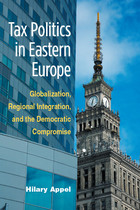
“This is the first book to systematically examine the variation in policies of Eastern European countries. There is a theoretical contribution to understandings of variation in tax policies, but just as impressive is the in-depth empirical analysis and in particular the data from interviews with key players in the process.”
—Yoshiko Herrera, University of Wisconsin-Madison
Post-Communist tax reform, like institutional reform in other areas of the post-Communist transition, holds tremendous material consequences for different groups in society. Consequently, one would expect the allocation of resources and the distribution of the financial burden of that allocation to be highly sensitive to domestic politics. Indeed the political stakes should be especially high since post-Communist tax reform requires not merely a simple adjustment at the margin, but the fundamental reallocation of the responsibility for government revenue. In Eastern Europe, however, important areas of tax policy do not reflect traditional domestic variables (e.g., interest groups and partisanship) so much as the international imperatives associated with regional and global economic integration.
In Tax Politics in Eastern Europe, Hilary Appel analyzes the domestic and international factors that drive tax policy. She begins with a review of the greatest challenges in the initial creation of the capitalist tax systems in former Communist states and then turns to the evolution of specific forms of taxation in order to gauge the relative impact of domestic politics on tax policy. Appel concludes that, although some tax areas, such as personal income taxes, remain politicized, most other taxes, such as corporate income taxes and all forms of consumption taxes, have been less subject to domestic political pressures because of powerful constraints resulting from regional and global economic integration.

As Shelton shows, many working- and middle-class whites sided with corporate interests in seeing themselves as society's only legitimate, productive members. This alliance increasingly argued that public employees and the urban poor took but did not give. Drawing on a wealth of research ranging from school board meetings to TV news reports, Shelton puts readers in the middle of fraught, intense strikes in Newark, St. Louis, and three other cities where these debates and shifting attitudes played out. He also demonstrates how the labor actions contributed to the growing public perception of unions as irrelevant or even detrimental to American prosperity. Foes of the labor movement, meanwhile, tapped into cultural and economic fears to undermine not just teacher unionism but the whole of liberalism.

Ana Margarita Gasteazoro (1950–1993) was a Salvadoran opposition activist and renowned Amnesty International prisoner of conscience. Tell Mother I’m in Paradise:Memoirs of a Political Prisoner in El Salvador recounts her extraordinary life story. From a privileged Catholic upbringing, with time spent studying and working abroad, Ana Margarita first became a member of the legal political opposition in the late 1970s and later a clandestine operative at work against the brutal military junta.
Gasteazoro recounts her early rebellion against the strictures of conservative upper-class Salvadoran society. She spoke perfect English and discovered a talent for organizing in administrative jobs abroad and at home. As the civil war progressed, she quickly became a valued figure in the National Revolutionary Movement (MNR), a social democratic party, often representing it at international meetings. Against the backdrop of massive social oppression and the “disappearances” of thousands of opposition members, Gasteazoro began a double life as an operative in a faction of the Farabundo Martí National Liberation Front (FMLN). Multitalented and energetic, she organized safe houses for fellow activists, transported weapons and equipment, wrote scripts for an underground radio station, and produced an award-winning documentary film. But the toll on her family life and personal relationships was heavy.
Ana Margarita was disappeared in May 1981 by the infamous National Guard and endured a nightmare 11 days of interrogations, beatings, and abuse. Through international pressure and the connections of her family, her arrest was finally made public, and she was transferred to the women’s prison at Ilopango. There, she and other activists continued the political struggle through the Committee of Political Prisoners of El Salvador (COPPES). During her two years in prison, tested by hunger strikes, violence, and factional divisions, she became one of Amnesty International’s best-known prisoners of conscience. Tell Mother I’m in Paradise is a gripping story of a self-aware activist and a vital young woman’s struggle to find her own way within a deeply conservative society.

“All my work fits in my mouth,” Jo Carson says. “I write performance material no matter what else the pieces get called, and whether they are for my voice or other characters’ voices … they are first to be spoken aloud.” Following an oral tradition that has strong roots in her native Tennessee, the author of Teller Tales invites the reader to participate in events in a way that no conventional history book can.
Both stories in this book are set in East Tennessee in the mid-eighteenth century and share certain characters. The first narrative, “What Sweet Lips Can Do,” recounts the story of the Overmountain Men and the battle of King’s Mountain, a tide-turning battle in the American Revolution. “Men of Their Time” is an exploration of white-Cherokee relationships from early contact through the time of the Revolution.
Although not well known to the outside world, the stories recounted in Teller Tales are cornerstones in the heritage of the Appalachian region and of American history. In ways that will appeal to young and old alike, Jo Carson’s irreverent telling will broaden the audience and the understanding for the stories of native Americans, settlers, explorers, and revolutionaries of early America.

The election of 1860 put to rest a tumultuous decade of legislative contest over the institution of slavery—even as it set in motion events that led directly to its demise by civil war. While some scholarship tends to minimize the role of slavery in the secession of the Southern states in the early 1860s, Dwight Pitcaithley’s Tennessee Secedes: A Documentary History takes the opposite approach, examining the many factors that both fueled and complicated Tennessee’s unique journey toward secession in 1861.
Organized chronologically by source and speaker, Tennessee Secedes presents a selection of primary sources from December 1860 through the summer of 1861, inviting students to examine the arc of Tennessee’s secession march. Pitcaithley introduces proclamations, declarations, addresses, resolutions, proposed constitutional amendments, and other materials from Tennessee legislators, members of Congress, and delegates to the East Tennessee Convention. These sources highlight the political divisions apparent in the Volunteer State during this season of unrest. While many other Southern states saw little support for Unionism in the early 1860s, Tennessee stood in stark contrast, with a large and vocal population that ardently opposed secession.
Complete with appendices featuring 1861 election returns, communications from the Tennessee Congressional Delegation of the Thirty-Sixth Congress, and a timeline for Secession Winter—as well as questions for further discussion—Tennessee Secedes is an invaluable resource for students of the Civil War and Tennessee history, offering an insightful analysis of Tennessee’s uncertain path to the Confederacy in the summer of 1861.
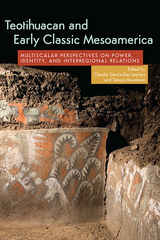
The volume offers a multiscalar view of power and identity, showing that the spread of Teotihuacan-related material culture may have resulted from direct and indirect state administration, colonization, emulation by local groups, economic transactions, single-event elite interactions, and various kinds of social and political alliances. The contributors explore questions concerning who interacted with whom; what kinds of materials and ideas were exchanged; what role interregional interactions played in the creation, transformation, and contestation of power and identity within the city and among local polities; and how interactions on different scales were articulated. The answers to these questions reveal an Early Classic Mesoamerican world engaged in complex economic exchanges, multidirectional movements of goods and ideas, and a range of material patterns that require local, regional, and macroregional contextualization.
Focusing on the intersecting themes of identity and power, Teotihuacan and Early Classic Mesoamerica makes a strong contribution to the understanding of the role of this important metropolis in the Early Classic history of the region. The volume will be of interest to scholars and graduate students of Mesoamerican archaeology, the archaeology of interaction, and the archaeology of identity.
Contributors: Sarah C. Clayton, Fiorella Fenoglio Limón, Agapi Filini, Julie Gazzola, Sergio Gómez-Chávez, Haley Holt Mehta, Carmen Pérez, Patricia Plunket, Juan Carlos Saint Charles Zetina, Yoko Sugiura, Gabriela Uruñuela, Gustavo Jaimes Vences

Teotihuacan was a city of major importance in the Americas between 1 and 550 CE. As one of only two cities in the New World with a population over one hundred thousand, it developed a network of influence that stretched across Mesoamerica. The size of its urban core, the scale of its monumental architecture, and its singular apartment compounds made Teotihuacan unique among Mesoamerica’s urban state societies.
Teotihuacan: The World Beyond the City brings together specialists in art and archaeology to develop a synthetic overview of the urban, political, economic, and religious organization of a key power in Classic-period Mesoamerica. The book provides the first comparative discussion of Teotihuacan’s foreign policy with respect to the Central Mexican Highlands, Oaxaca, Veracruz, and the Maya Lowlands and Highlands. Contributors debate whether Teotihuacan’s interactions were hegemonic, diplomatic, stylistic, or a combination of these or other social processes. The authors draw on recent investigations and discoveries to update models of Teotihuacan’s history, in the process covering various questions about the nature of Teotihuacan’s commercial relations, its political structure, its military relationships with outlying areas, the prestige of the city, and the worldview it espoused through both monumental architecture and portable media.
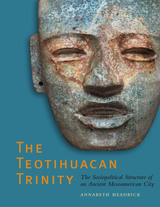
Northeast of modern-day Mexico City stand the remnants of one of the world's largest preindustrial cities, Teotihuacan. Monumental in scale, Teotihuacan is organized along a three-mile-long thoroughfare, the Avenue of the Dead, that leads up to the massive Pyramid of the Moon. Lining the avenue are numerous plazas and temples, which indicate that the city once housed a large population that engaged in complex rituals and ceremonies. Although scholars have studied Teotihuacan for over a century, the precise nature of its religious and political life has remained unclear, in part because no one has yet deciphered the glyphs that may explain much about the city's organization and belief systems.
In this groundbreaking book, Annabeth Headrick analyzes Teotihuacan's art and architecture, in the light of archaeological data and Mesoamerican ethnography, to propose a new model for the city's social and political organization. Challenging the view that Teotihuacan was a peaceful city in which disparate groups united in an ideology of solidarity, Headrick instead identifies three social groups that competed for political power—rulers, kin-based groups led by influential lineage heads, and military orders that each had their own animal insignia. Her findings provide the most complete evidence to date that Teotihuacan had powerful rulers who allied with the military to maintain their authority in the face of challenges by the lineage heads. Headrick's analysis also underscores the importance of warfare in Teotihuacan society and clarifies significant aspects of its ritual life, including shamanism and an annual tree-raising ceremony that commemorated the Mesoamerican creation story.
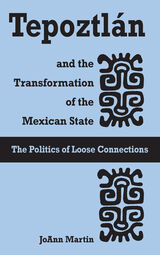
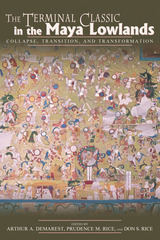
Featuring an impressive roster of scholars, The Terminal Classic presents the most recent data and interpretations pertaining to this perplexing period of cultural transformation in the Maya lowlands. Although the research reveals clear interregional patterns, the contributors resist a single overarching explanation. Rather, this volume's diverse and nuanced interpretations provide a new, more properly grounded beginning for continued debate on the nature of lowland Terminal Classic Maya civilization.

Escobar illuminates many interrelated dynamics, including the Colombian government’s policies of development and pluralism that created conditions for the emergence of black and indigenous social movements and those movements’ efforts to steer the region in particular directions. He examines attempts by capitalists to appropriate the rainforest and extract resources, by developers to set the region on the path of modernist progress, and by biologists and others to defend this incredibly rich biodiversity “hot-spot” from the most predatory activities of capitalists and developers. He also looks at the attempts of academics, activists, and intellectuals to understand all of these complicated processes. Territories of Difference is Escobar’s effort to think with Afro-Colombian intellectual-activists who aim to move beyond the limits of Eurocentric paradigms as they confront the ravages of neoliberal globalization and seek to defend their place-based cultures and territories.

In this innovative and revelatory work, Igal Halfin exposes the inner struggles of Soviet Communists to identify themselves with the Bolshevik Party during the decisive decades of the 1920s and 1930s. The Bolsheviks preached the moral transformation of Russians into model Communists for their political and personal salvation. To screen the population for moral and political deviance, the Bolsheviks enlisted natural scientists, doctors, psychologists, sexologists, writers, and Party prophets to establish criteria for judging people. Self-inspection became a central Bolshevik practice. Communists were expected to write autobiographies in which they reconfigured their life experience in line with the demands of the Party.
Halfin traces the intellectual contortions of this project. Initially, the Party denounced deviant Communists, especially the Trotskyists, as degenerate, but innocuous, souls; but in a chilling turn in the mid-1930s, the Party came to demonize the unreformed as virulent, malicious counterrevolutionaries. The insistence that the good society could not triumph unless every wicked individual was destroyed led to the increasing condemnation of Party members as helplessly flawed.
Combining the analysis of autobiography with the study of Communist psychology and sociology and the politics of Bolshevik self-fashioning, Halfin gives us powerful new insight into the preconditions of the bloodbath that was the Great Purge.

Natural right—the idea that there is a collection of laws and rights based not on custom or belief but that are “natural” in origin—is typically associated with liberal politics and freedom. In The Terror of Natural Right, Dan Edelstein argues that the revolutionaries used the natural right concept of the “enemy of the human race”—an individual who has transgressed the laws of nature and must be executed without judicial formalities—to authorize three-quarters of the deaths during the Terror. Edelstein further contends that the Jacobins shared a political philosophy that he calls “natural republicanism,” which assumed that the natural state of society was a republic and that natural right provided its only acceptable laws. Ultimately, he proves that what we call the Terror was in fact only one facet of the republican theory that prevailed from Louis’s trial until the fall of Robespierre.
A highly original work of historical analysis, political theory, literary criticism, and intellectual history, The Terror of Natural Right challenges prevailing assumptions of the Terror to offer a new perspective on the Revolutionary period.

After defeating a segregationist campaign in 1960 to win the governorship, Sanford used his years in office to boost public education and advance race relations. A decade later, at the height of tumult on American campuses, Sanford assumed the presidency of Duke University and led it to its position as one of the top universities in the nation. During his more than fifty years as a public servant he was associated with presidents John F. Kennedy, Lyndon B. Johnson, Richard Nixon, and Jimmy Carter. Sanford was a presidential candidate himself in 1972 and 1976, and he won election to the United States Senate in 1986 where his international commission produced an economic recovery plan for Central America. As one of the last New Deal Democrats in the Senate, he remained passionate about the opportunity for leaders to use government to improve people’s lives.
Terry Sanford draws on Sanford’s considerable private and public archive as well as on the recollections of Sanford himself and his family, colleagues, and friends. This biography offers a unique perspective on North Carolina life, politics, political personalities, and the shifting public allegiances of the second half of the twentieth century that transformed life both in North Carolina and throughout the American South.
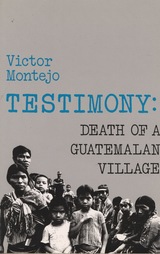
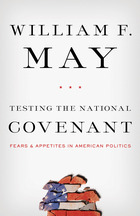
Since the end of World War II, runaway fears of Soviet imperialism, global terrorism, and anarchy have tended to drive American foreign policy toward an imperial agenda. At the same time, uncurbed appetites have wasted the environment and driven the country’s market economy into the ditch. How can we best sustain our identity as a people and resist the distortions of our current anxieties and appetites?
Ethicist William F. May draws on America’s religious and political history and examines two concepts at play in the founding of the country—contractual and covenantal. He contends that the biblical idea of a covenant offers a more promising way than the language of contract, grounded in self-interest alone, to contain our runaway anxieties and appetites. A covenantal sensibility affirms, “We the people (not simply, We the individuals, or We the interest groups) of the United States.” It presupposes a history of mutual giving and receiving and of bearing with one another that undergirds all the traffic in buying and selling, arguing and negotiating, that obtain in the rough terrain of politics. May closes with an account of the covenantal agenda ahead, and concludes with the vexing issue of immigrants and undocumented workers that has singularly tested the covenant of this immigrant nation.

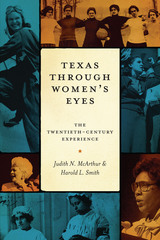
Winner, Liz Carpenter Award For Research in the History of Women, Texas State Historical Association, 2010
Texas women broke barriers throughout the twentieth century, winning the right to vote, expanding their access to higher education, entering new professions, participating fully in civic and political life, and planning their families. Yet these major achievements have hardly been recognized in histories of twentieth-century Texas. By contrast, Texas Through Women's Eyes offers a fascinating overview of women's experiences and achievements in the twentieth century, with an inclusive focus on rural women, working-class women, and women of color.
McArthur and Smith trace the history of Texas women through four eras. They discuss how women entered the public sphere to work for social reforms and the right to vote during the Progressive era (1900–1920); how they continued working for reform and social justice and for greater opportunities in education and the workforce during the Great Depression and World War II (1920–1945); how African American and Mexican American women fought for labor and civil rights while Anglo women laid the foundation for two-party politics during the postwar years (1945–1965); and how second-wave feminists (1965–2000) promoted diverse and sometimes competing goals, including passage of the Equal Rights Amendment, reproductive freedom, gender equity in sports, and the rise of the New Right and the Republican party.
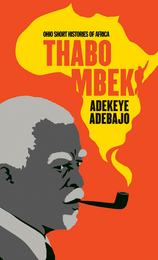
Former South African president Thabo Mbeki is a complex figure. He was a committed young Marxist who, while in power, embraced conservative economic policies and protected white corporate interests; a rational and dispassionate thinker who was particularly sensitive to criticism and dissent; and a champion of African self-reliance who relied excessively on foreign capital.
As a key liberation leader in exile, he was instrumental in the ANC’s antiapartheid struggle. Later, he helped build one of the world’s most respected constitutional democracies. As president, though, he was unable to overcome inherited socioeconomic challenges, and his disastrous AIDS policies will remain a major blotch on his legacy.
Mbeki is the most important African political figure of his generation. He will be remembered as a foreign policy president for his peacemaking efforts and his role in building continental institutions, not least of which was the African Union. In this concise biography, ideally suited for the classroom, Adekeye Adebajo seeks to illuminate Mbeki’s contradictions and situate him in a pan-African pantheon.
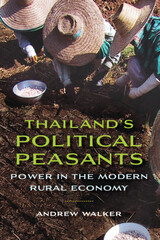
When a populist movement elected Thaksin Shinawatra as prime minister of Thailand in 2001, many of the country’s urban elite dismissed the outcome as just another symptom of rural corruption, a traditional patronage system dominated by local strongmen pressuring their neighbors through political bullying and vote-buying. In Thailand’s Political Peasants, however, Andrew Walker argues that the emergence of an entirely new socioeconomic dynamic has dramatically changed the relations of Thai peasants with the state, making them a political force to be reckoned with. Whereas their ancestors focused on subsistence, this generation of middle-income peasants seeks productive relationships with sources of state power, produces cash crops, and derives additional income through non-agricultural work. In the increasingly decentralized, disaggregated country, rural villagers and farmers have themselves become entrepreneurs and agents of the state at the local level, while the state has changed from an extractor of taxes to a supplier of subsidies and a patron of development projects.
Thailand’s Political Peasants provides an original, provocative analysis that encourages an ethnographic rethinking of rural politics in rapidly developing countries. Drawing on six years of fieldwork in Ban Tiam, a rural village in northern Thailand, Walker shows how analyses of peasant politics that focus primarily on rebellion, resistance, and evasion are becoming less useful for understanding emergent forms of political society.

When the world descended into war in 1939, few European countries remained neutral; but of those that did, none provoked more controversy than Ireland.
Despite Winston Churchill's best efforts to the contrary, the Irish premier Eamon de Valera stuck determinedly to Ireland's right to remain outside a conflict in which it had no enemies. Accusations of betrayal and hypocrisy poisoned the media; legends of Nazi spies roaming the country depicted Ireland as a haven for Hitler's friends. Where previous histories of Ireland in the war years have focused on high politics, That Neutral Island mines deeper layers of experience. Sean O'Faolain, Kate O'Brien, Elizabeth Bowen, Flann O'Brien and Louis MacNeice are a handful of writers whose stories, letters, and diaries illuminate this small country as it suffered rationing, censorship, the threat of invasion, and a strange detachment from the war.
Clair Wills brings to life the atmosphere of a country forced largely to do without modern technology. She describes the work of those who recovered the bodies of British sailors and airmen from the sea. She unearths the motivations of thousands who left to join the British forces. And she shows how ordinary people struggled to make sense of the Nazi threat through the lens of antagonism to Britain, the former colonial power. She acutely targets the sleight-of-hand that hovers around the Irish definition of "neutrality."
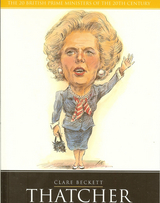
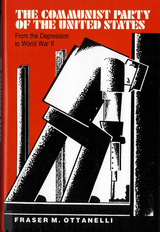

A compelling study of the origins and trajectory of one of the legendary black uprisings against apartheid, Theatres of Struggle and the End of Apartheid draws on insights gained from the literature on collective action and social movements. It delves into the Alexandra Rebellion of 1986 to reveal its inner workings.
Belinda Bozzoli’s aim is to examine how the residents of Alexandra, a poverty-stricken segregated township in Johannesburg, manipulated and overturned the meanings of space, time, and power in their sequestered world. She explains how they used political theater to convey, stage, and dramatize their struggle and how young and old residents generated differing ideologies and tactics, giving rise to a distinct form of generational politics.
Theatres of Struggle and the End of Apartheid asks the reader to enter into the world of the rebels and to confront the moral complexity and social duress they experienced as they invented new social forms and violently attacked old ones. It is an important study of collective action that will be of great interest to sociologists and to scholars of Africa, particularly to those interested in the antiapartheid struggle.
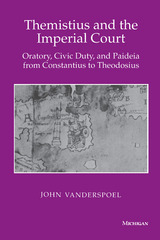

In this groundbreaking study, Joyce Hoffmann examines a critical twenty-five-year period in the work of one of the most influential journalists of the twentieth century. Theodore H. White was already a celebrated reporter when Jacqueline Kennedy summoned him for an exclusive interview in the aftermath of her husband's assassination. With her help, White would preserve what the First Lady claimed had been John F. Kennedy's vision of the New Frontier as an incarnation of that wistful, romantic kingdom--Camelot. Over the years, friends and advisers to Kennedy declared that they had never heard the president speak of Camelot. But White's article, which ran in Life magazine, created a myth that still endures in the popular consciousness.
That story was just one of many by Theodore White that had a lasting impact on the nation. As a correspondent for several of the country's most popular magazines, he covered the crucial events of the 1940s, '50s, and '60s. His best-selling book The Making of the President 1960 changed political reporting forever.
A gifted and likable man with a remarkable skill for ingratiating himself with others, White earned the confidence of key political, military, and diplomatic leaders. First in the Far East, later in Europe, and finally in Washington, D.C., he became a confidant and adviser rather than an adversary to the figures he covered for the news, following a pattern set by elite journalists. Even as he played the impartial reporter, White kept secrets in order to maintain access to his important sources, and he occasionally allowed his subjects, including John F. Kennedy and Nelson Rockefeller, to make changes in his work before publication.
Clinging to the illusion of objectivity, White--like other leading journalists in the postwar years--wrote about the world not as it was but as he believed it ought to be. Hoffmann relates the little-known episode in White's career when he intentionally obscured the truth about Chiang Kai-shek's corrupt and inept Nationalist government because he believed that undermining China's cause would be "a disservice to democracy."
No other book so thoroughly documents how a first-rank journalist can become a political insider and distort the news without losing the gloss of impartiality that is supposed to accompany the profession. Impressively researched, skillfully written, Theodore H. White and Journalism as Illusion is an unflinching look at a key figure in the history of American journalism and at the profession itself.
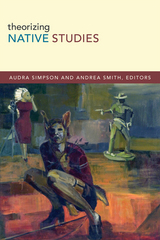
Contributors. Christopher Bracken, Glen Coulthard, Mishuana Goeman, Dian Million, Scott Morgensen, Robert Nichols, Vera Palmer, Mark Rifkin, Audra Simpson, Andrea Smith, Teresia Teaiwa


Even in the period following the electoral defeat of the Sandinista National Liberation Front (FSLN) in 1990, the revolution of 1979 continues to have a profound effect on the political economy of Nicaragua. Wright’s study, which is based on interviews with people from all walks of life—from government and party officials to academics and campesinos—as well as on the large volume of literature in both English and Spanish, focuses on the FSLN understanding of the relationships between the state, the party, and mass actors, and the nature of social classes. Wright considers the topics of agrarian reform, the development of mass organizations, the role of labor, and other aspects of the Nicaraguan political economy in order to assess their significance in theoretical as well as practical terms.
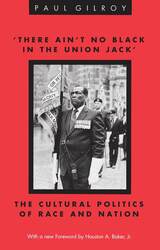
"Gilroy demonstrates effectively that cultural traditions are not static, but develop, grow and indeed mutate, as they influence and are influenced by the other changing traditions around them."—David Edgar, Listener Review of Books.
"A fascinating analysis of the discourses that have accompanied black settlement in Britain. . . . An important addition to the stock of critical works on race and culture."—David Okuefuna, Chicago Tribune
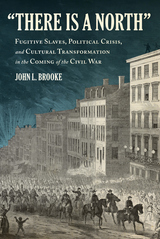
While Lincoln's alleged quip about the little woman who started the big war has been oft-repeated, scholars have not fully explained the dynamics between politics and culture in the decades leading up to 1861. Rather than simply viewing the events of the 1850s through the lens of party politics, "There Is a North" is the first book to explore how cultural action—including minstrelsy, theater, and popular literature—transformed public opinion and political structures. Taking the North's rallying cry as his title, Brooke shows how the course of history was forever changed.

On a sultry September morning in 1955, a young African American man, the son of share croppers, boarded a Greyhound bus in Birmingham, Alabama, to leave his home state for the first time in his life. He was headed for the University of Detroit on a teaching scholarship from MilesCollege. Richard Arrington could not have guessed then that his future as a teacher would be postponed for decades by big-city politics--and that he would serve a record-setting five terms as chief executive of Alabama’s largest city.
Under Arrington’s leadership, Birmingham rebuilt itself from a foundering, steel-driven industrial center to one of the most diversified metropolitan areas in the Southeast, with an economy fueled by health care, biomedical research, engineering, telecommunications, and banking. As mayor, Arrington’s economic legacy is impressive. When he left office, Birmingham boasted a record number of jobs and the lowest unemployment rate in its history. Additionally, Birmingham had built the strongest tax base in Alabama, expanded its city limits by 60 square miles, reduced crime to its lowest level in 25 years, and funded a $260 million school construction program. Today Birmingham is financially sound and is the only city in the Southeast with a $100 million endowment fund.

With These Islands, Ali M. Ansari considers the idea of Britain as a political entity. This idea of Britain considers some nationalists as suppressed minorities in need of attention, and others as bigoted throwbacks to a more divisive age. Arguing the case for Great Britain from the perspective of the political mythology of the British state—with an emphasis on culture, ideas and narrative constructions—Ansari makes the claim that Britain’s strength lies in its ability to shape the popular imagination, both at home and abroad. He concludes that an “excess of enthusiasm” may yet do untold damage to the fabric of a state and society that has been carefully constructed over the centuries and may not be easily repaired.
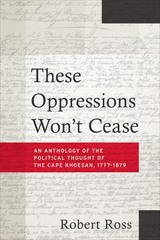

The imposition of modern American colonial rule has defined U.S.–indigenous relations since the time of the American Civil War. In resistance, Kevin Bruyneel asserts, indigenous political actors work across American spatial and temporal boundaries, demanding rights and resources from the government while also challenging the imposition of colonial rule over their lives. This resistance engenders what he calls a “third space of sovereignty,” which resides neither inside nor outside the U.S. political system but rather exists on its boundaries, exposing both the practices and limitations of American colonial rule.
The Third Space of Sovereignty offers fresh insights on such topics as the crucial importance of the formal end of treaty-making in 1871, indigenous responses to the prospect of U.S. citizenship in the 1920s, native politics during the tumultuous civil rights era of the 1960s, the question of indigenousness in the special election of California’s governor in 2003, and the current issues surrounding gaming and casinos.
In this engaging and provocative work, Bruyneel shows how native political actors have effectively contested the narrow limits that the United States has imposed on indigenous people’s ability to define their identity and to develop economically and politically on their own terms.
Kevin Bruyneel is assistant professor of politics at Babson College.

In this work Peter Worsley analyzes the unique political forms that have evolved as a result of these two basic conditions. In his view the third world has rejected both of the great ideologies of today. Their new solutions are unique in world history, being based on populism, socialism, and, often, the one-party state, which, although anathema to the Western liberal, is a natural development in societies united by the common enemy of colonialism.
"No one seriously concerned with the greatest problem of our time, the division of the world between the developed, industrialized, 'affluent' countries and les nations prolétaires, can afford to miss this book. . . . Professor Worsley has succeeded in giving us more solid information about underdeveloped parts of the world than can be found in any other book of comparable length."—The Times Literary Supplement
"Peter Worsley . . . has written an excellent descriptive analysis of the evolution and present state of a third force in world politics. Africa, Asia, and the Middle East have . . . given society not only a new philosophy with new goals but charismatic philosophers who have the potential to make the philosophy of the third world a vital presence to be reckoned with. . . . a brilliant book."—Peter Schwab, Journal of Modern African Studies
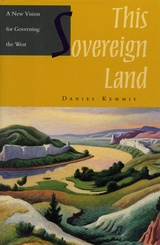
In the eight states of the interior West (Arizona, Colorado, Idaho, Montana, Nevada, New Mexico, Utah, and Wyoming), 260 million acres -- more than 48 percent of the land base -- are owned by the federal government and managed by its Washington, D.C.-based agencies. Like many other peoples throughout history who have bristled under the controlling hand of a remote government, westerners have long nursed a deep resentment toward our nation's capital. Rumblings of revolution have stirred for decades, bolstered in recent years by increasing evidence of the impossibility of a distant, centralized government successfully managing the West's widespread and far-flung lands.
In This Sovereign Land, Daniel Kemmis offers a radical new proposal for giving the West control over its land. Unlike those who wish to privatize the public lands and let market forces decide their fate, Kemmis, a leading western Democrat and committed environmentalist, argues for keeping the public lands public, but for shifting jurisdiction over them from nation to region. In place of the current centralized management, he offers a regional approach that takes into account natural topographical and ecological features, and brings together local residents with a vested interest in ensuring the sustainability of their communities. In effect, Kemmis carries to their logical conclusion the recommendations about how the West should be governed made by John Wesley Powell more than a century ago.
Throughout, Kemmis argues that the West no longer needs to be protected against itself by a paternalistic system and makes a compelling case that the time has come for the region to claim sovereignty over its own landscape. This Sovereign Land provides a provocative opening to a much-needed discussion about how democracy and ecological sustainability can go hand in hand, and will be essential reading for anyone interested in the West and western issues, as well as for all those concerned with place-based conservation, public lands management, bioregionalism, or related topics.
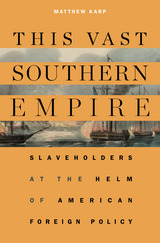
Winner of the John H. Dunning Prize, American Historical Association
Winner of the Stuart L. Bernath Book Prize, Society for Historians of American Foreign Relations
Winner of the James H. Broussard Best First Book Prize, Society for Historians of the Early American Republic
Winner of the North Jersey Civil War Round Table Book Award
Finalist for the Harriet Tubman Prize, Lapidus Center for the Historical Analysis of Transatlantic Slavery
When the United States emerged as a world power in the years before the Civil War, the men who presided over the nation’s triumphant territorial and economic expansion were largely southern slaveholders. As presidents, cabinet officers, and diplomats, slaveholding leaders controlled the main levers of foreign policy inside an increasingly powerful American state. This Vast Southern Empire explores the international vision and strategic operations of these southerners at the commanding heights of American politics.
“At the close of the Civil War, more than Southern independence and the bones of the dead lay amid the smoking ruins of the Confederacy. Also lost was the memory of the prewar decades, when Southern politicians and pro-slavery ambitions shaped the foreign policy of the United States in order to protect slavery at home and advance its interests abroad. With This Vast Southern Empire, Matthew Karp recovers that forgotten history and presents it in fascinating and often surprising detail.”
—Fergus Bordewich, Wall Street Journal
“Matthew Karp’s illuminating book This Vast Southern Empire shows that the South was interested not only in gaining new slave territory but also in promoting slavery throughout the Western Hemisphere.”
—David S. Reynolds, New York Review of Books

This Was Not Our War shares amazing first-person accounts of twenty-six Bosnian women who are reconstructing their society following years of devastating warfare. A university student working to resettle refugees, a paramedic who founded a veterans’ aid group, a fashion designer running two nonprofit organizations, a government minister and professor who survived Auschwitz—these women are advocates, politicians, farmers, journalists, students, doctors, businesswomen, engineers, wives, and mothers. They are from all parts of Bosnia and represent the full range of ethnic traditions and mixed heritages. Their ages spread across sixty years, and their wealth ranges from expensive jewels to a few chickens. For all their differences, they have this much in common: all survived the war with enough emotional strength to work toward rebuilding their country. Swanee Hunt met these women through her diplomatic and humanitarian work in the 1990s. Over the course of seven years, she conducted multiple interviews with each one. In presenting those interviews here, Hunt provides a narrative framework that connects the women’s stories, allowing them to speak to one another.
The women describe what it was like living in a vibrant multicultural community that suddenly imploded in an onslaught of violence. They relate the chaos; the atrocities, including the rapes of many neighbors and friends; the hurried decisions whether to stay or flee; the extraordinary efforts to care for children and elderly parents and to find food and clean drinking water. Reflecting on the causes of the war, they vehemently reject the idea that age-old ethnic hatreds made the war inevitable. The women share their reactions to the Dayton Accords, the end of hostilities, and international relief efforts. While they are candid about the difficulties they face, they are committed to rebuilding Bosnia based on ideals of truth, justice, and a common humanity encompassing those of all faiths and ethnicities. Their wisdom is instructive, their courage and fortitude inspirational.
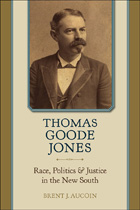
Often overshadowed by the pharaonic antebellum period, the Civil War, and the luminous heights of the civil rights movement, the deceptively placid decades at the turn of the century were, in fact, a period when southerners fiercely debated the course of the South’s future. In tracing Jones’s career, Brent J. Aucoin offers vivid accounts of the great events and trends of that pivotal period: Reconstruction, the birth of the “Solid South,” the Populist Revolt, and the establishment of racial disenfranchisement and segregation.
Born in 1844, Jones served in the Confederate army and after the war identified as a conservative “Bourbon” Democrat. He served as Alabama's governor from 1890 to 1894 and as a federal judge from 1901 until his death in 1914. As a veteran, politician, and judge, Jones embodied numerous roles in the shifting political landscape of the South.
Jones was not, however, a reflexive conformist and sometimes pursued policies at odds with his party. Jones’s rhetoric and support of African American civil rights were exceptional and earned him truculent criticism from unrepentant racist factions in his party. His support was so fearless that it inspired Booker T. Washington to recommend Jones to Republican president Theodore Roosevelt as a federal judge. On the bench, Jones garnered national attention for his efforts to end peonage and lynching, and yet he also enabled the establishment of legalized segregation in Alabama, confounding attempts easily to categorize him as an odious reactionary or fearless progressive.
A man who both represented and differed from his class, Thomas Goode Jones offers contemporary readers and scholars an ideal subject of study to understand a period of southern history that still shapes American life today.
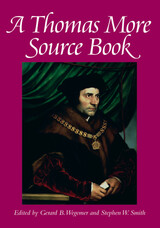




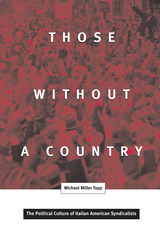
In the first book-length history of the Italian American syndicalist movement—the Italian Socialist Federation—Michael Miller Topp presents a new way of understanding the Progressive Era labor movement in relation to migration, transnationalism, gender, and class identity. Those without a Country demonstrates that characterizations of "old" (pre-1960s) social movements as predominantly class-based are vastly oversimplified—and contribute to current debates about the implications of identity politics for the American Left and American culture generally.
Topp traces the rise and fall of the Italian American syndicalist movement from the turn of the twentieth century to the executions of Sacco and Vanzetti in 1927. His use of Italian-language sources, combined with his attention to transnationalism and masculinity, provides new vantage points on a range of related topics, including the 1912 Lawrence, Massachusetts, textile workers’ strike, the impact of World War I on this immigrant community, and the genesis of both fascism and antifascism. Those without a Country brings forward fascinating new material to revise and refine our views of not only Progressive Era radicalism but immigration, gender, and working-class history as well.

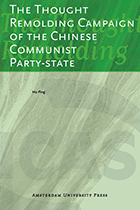
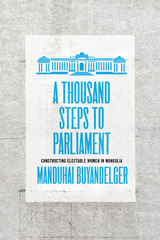
Mongolia has often been deemed an “island of democracy,” commended for its rapid adoption of free democratic elections in the wake of totalitarian socialism. The democratizing era, however, brought alongside it a phenomenon that Manduhai Buyandelger terms “electionization”—a restructuring of elections from time-grounded events into a continuous neoliberal force that governs everyday life beyond the electoral period. In this way, electoral campaigns have come to substitute for the functions of governing, from social welfare to the private sector, requiring an accumulation of wealth and power beyond the reach of most women candidates. In A Thousand Steps to Parliament, Buyandelger shows how successful women candidates instead use strategies of self-polishing to cultivate charisma and a reputation for being oyunlag, or intellectful. This carefully crafted identity can be called the “electable self”: treating their bodies and minds as pliable and renewable, women candidates draw from the same practices of neoliberalism that have unsustainably commercialized elections. By tracing the complicated, contradictory paths to representation that women in Mongolia must walk, A Thousand Steps to Parliament holds a mirror up to democracies the world over, revealing an urgent need to grapple with the encroaching effects of neoliberalism in our global political systems.

In the early days of 1937, the Ohio River, swollen by heavy winter rains, began rising. And rising. And rising. By the time the waters crested, the Ohio and Mississippi had climbed to record heights. Nearly four hundred people had died, while a million more had run from their homes. The deluge caused more than half a billion dollars of damage at a time when the Great Depression still battered the nation.
Timed to coincide with the flood's seventy-fifth anniversary, The Thousand-Year Flood is the first comprehensive history of one of the most destructive disasters in American history. David Welky first shows how decades of settlement put Ohio valley farms and towns at risk and how politicians and planners repeatedly ignored the dangers. Then he tells the gripping story of the river's inexorable rise: residents fled to refugee camps and higher ground, towns imposed martial law, prisoners rioted, Red Cross nurses endured terrifying conditions, and FDR dispatched thousands of relief workers. In a landscape fraught with dangers—from unmoored gas tanks that became floating bombs to powerful currents of filthy floodwaters that swept away whole towns—people hastily raised sandbag barricades, piled into overloaded rowboats, and marveled at water that stretched as far as the eye could see. In the flood's aftermath, Welky explains, New Deal reformers, utopian dreamers, and hard-pressed locals restructured not only the flood-stricken valleys, but also the nation's relationship with its waterways, changes that continue to affect life along the rivers to this day.
A striking narrative of danger and adventure—and the mix of heroism and generosity, greed and pettiness that always accompany disaster—The Thousand-Year Flood breathes new life into a fascinating yet little-remembered American story.

The Threat of Liberation returns to the tumultuous years of the Cold War, when, in a striking parallel with today, imperialist powers were seeking to institute ‘regime change’ and install pliant governments.
Using iconic photographs, declassified US and British documents, and in-depth interviews, Amrit Wilson examines the role of the Umma Party of Zanzibar and its leader, the visionary Marxist revolutionary, Abdulrahman Mohamed Babu. Drawing parallels between US paranoia about Chinese Communist influence in the 1960s with contemporary fears about Chinese influence, it looks at the new race for Africa’s resources, the creation of AFRICOM and how East African politicians have bolstered US control. The book also draws on US cables released by Wikileaks showing Zanzibar's role in the ‘War on Terror’ in Eastern Africa today.
The Threat of Liberation reflects on the history of a party which confronted imperialism and built unity across ethnic divisions, and considers the contemporary relevance of such strategies.


Through French Windows is a journey into contemporary French culture and society. By describing the country's education, religion, politics, finances, technology and telecommunications, and social and ethical issues, Corbett draws a portrait of present-day France.
The author provides background information necessary for understanding the changes that continue to evolve. Corbett conscientiously avoids the traditional and simplistic means of portraying France that emphasizes the cultural heritage of the country. Instead he provides an insider's view of France, separating that mythic image from the current reality. Further, he presents an accurate portrayal of the diversity of France by moving beyond the typical dichotomy between Paris and the rest of the country or the oversimplification of dividing the country into north and south.
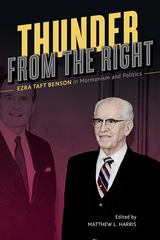
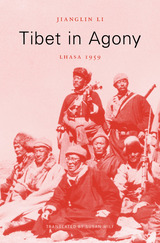
The Chinese Communist government has twice invoked large-scale military might to crush popular uprisings in capital cities. The second incident—the notorious massacre in Tiananmen Square in 1989—is well known. The first, thirty years earlier in Tibet, remains little understood today. Yet in wages of destruction, bloodshed, and trampling of human rights, the tragic toll of March 1959 surpassed Tiananmen.
Tibet in Agony provides the first clear historical account of the Chinese crackdown in Lhasa. Sifting facts from the distortions of propaganda and partisan politics, Jianglin Li reconstructs a chronology of events that lays to rest lingering questions about what happened in those fate-filled days and why. Her story begins with throngs of Tibetan demonstrators who—fearful that Chinese authorities were planning to abduct the Dalai Lama, their beloved leader—formed a protective ring around his palace. On the night of March 17, he fled in disguise, only to reemerge in India weeks later to set up a government in exile. But no peaceful resolution awaited Tibet. The Chinese army soon began shelling Lhasa, inflicting thousands of casualties and ravaging heritage sites in the bombardment and the infantry onslaught that followed. Unable to resist this show of force, the Tibetans capitulated, putting Mao Zedong in a position to fulfill his long-cherished dream of bringing Tibet under the Communist yoke.
Li’s extensive investigation, including eyewitness interviews and examination of classified government records, tells a gripping story of a crisis whose aftershocks continue to rattle the region today.

"James Cannon, formerly national affairs editor at Newsweek and Ford's domestic policy advisor, has written a superbly provocative and arresting biography that traces Ford's life from his July 4, 1913, birth in Omaha, Nebraska, to his September 8,1974, decision to pardon Nixon of the Watergate conspiracy." --Washington Post Book World
James M. Cannon is a journalist and was Domestic Policy Adviser to President Ford and Chief of Staff to Senate Majority Leader Howard Baker.
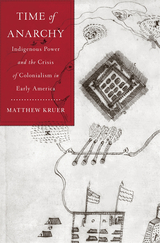
A gripping account of the violence and turmoil that engulfed England’s fledgling colonies and the crucial role played by Native Americans in determining the future of North America.
In 1675, eastern North America descended into chaos. Virginia exploded into civil war, as rebel colonists decried the corruption of planter oligarchs and massacred allied Indians. Maryland colonists, gripped by fears that Catholics were conspiring with enemy Indians, rose up against their rulers. Separatist movements and ethnic riots swept through New York and New Jersey. Dissidents in northern Carolina launched a revolution, proclaiming themselves independent of any authority but their own. English America teetered on the edge of anarchy.
Though seemingly distinct, these conflicts were in fact connected through the Susquehannock Indians, a once-mighty nation reduced to a small remnant. Forced to scatter by colonial militia, Susquehannock bands called upon connections with Indigenous nations from the Great Lakes to the Deep South, mobilizing sources of power that colonists could barely perceive, much less understand. Although the Susquehannock nation seemed weak and divided, it exercised influence wildly disproportionate to its size, often tipping settler societies into chaos. Colonial anarchy was intertwined with Indigenous power.
Piecing together Susquehannock strategies from a wide range of archival documents and material evidence, Matthew Kruer shows how one people’s struggle for survival and renewal changed the shape of eastern North America. Susquehannock actions rocked the foundations of the fledging English territories, forcing colonial societies and governments to respond. Time of Anarchy recasts our understanding of the late seventeenth century and places Indigenous power at the heart of the story.
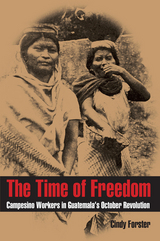
"The time of freedom" was the name that plantation workers—campesinos—gave to Guatemala’s national revolution of 1944–1954. Cindy Forster reveals the critical role played by the poor in organizing and sustaining this period of reform.
Through court records, labor and agrarian ministry archives, and oral histories, Forster demonstrates how labor conflict on the plantations prepared the ground for national reforms that are usually credited to urban politicians. She focuses on two plantation zones that generated exceptional momentum: the coffee belt in the highlands around San Marcos and the United Fruit Company’s banana groves near Tiquisate. Although these regions were unlike in size and complexity, language and race, popular culture and work patterns, both erupted with demands for workers’ rights and economic justice shortly after the fall of Castañeda in 1944.
A welcome balance to the standard "top-down" histories of the revolution, Forster’s sophisticated analysis demonstrates how campesinos changed the course of the urban revolution. By establishing the context of grassroots mobilization, she substantially alters the conventional view of the entire revolution, and particularly the reforms enacted under President Albenz.
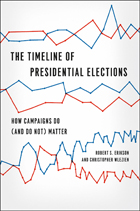


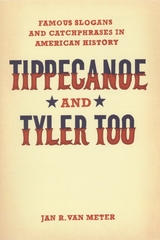
“By necessity, by proclivity, by delight,” Ralph Waldo Emerson said in 1876, “we all quote.” But often the phrases that fall most readily from our collective lips—like “fire when ready,” “speak softly and carry a big stick,” or “nice guys finish last”—are those whose origins and true meanings we have ceased to consider. Restoring three-dimensionality to more than fifty of these American sayings, Tippecanoe and Tyler Too turns clichés back into history by telling the life stories of the words that have served as our most powerful battle cries, rallying points, laments, and inspirations.
In individual entries on slogans and catchphrases from the early seventeenth to the late twentieth century, Jan Van Meter reveals that each one is a living, malleable entity that has profoundly shaped and continues to influence our public culture. From John Winthrop’s “We shall be as a city upon a hill” and the 1840 Log Cabin Campaign’s “Tippecanoe and Tyler Too” to Martin Luther King Jr.’s “I have a dream” and Ronald Reagan’s “Mr. Gorbachev, tear down this wall,” each of Van Meter’s selections emerges as a memory device for a larger political or cultural story. Taken together in Van Meter’s able hands, these famous slogans and catchphrases give voice to our common history even as we argue about where it should lead us.
“As Van Meter argues, these are important ‘memory devices for a larger story.’ . . . The author has thoroughly researched all the catchphrases . . . . This book would make delightful in-flight reading or a nice gift for a trivia buff. Recommended.”—Choice

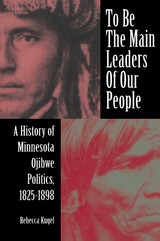
In the spring of 1868, people from several Ojibwe villages located along the upper Mississippi River were relocated to a new reservation at White Earth, more than 100 miles to the west. In many public declarations that accompanied their forced migration, these people appeared to embrace the move, as well as their conversion to Christianity and the new agrarian lifestyle imposed on them. Beneath this surface piety and apparent acceptance of change, however, lay deep and bitter political divisions that were to define fundamental struggles that shaped Ojibwe society for several generations.
In order to reveal the nature and extent of this struggle for legitimacy and authority, To Be The Main Leaders of Our People reconstructs the political and social history of these Minnesota Ojibwe communities between the years 1825 and 1898. Ojibwe political concerns, the thoughts and actions of Ojibwe political leaders, and the operation of the Ojibwe political system define the work's focus. Kugel examines this particular period of time because of its significance to contemporary Ojibwe history. The year 1825, for instance, marked the beginning of a formal alliance with the United States; 1898 represented not an end, but a striking point of continuity, defying the easy categorizations of Native peoples made by non-Indians, especially in the closing years of the nineteenth century.
In this volume, the Ojibwe "speak for themselves," as their words were recorded by government officials, Christian missionaries, fur traders, soldiers, lumbermen, homesteaders, and journalists. While they were nearly always recorded in English translation, Ojibwe thoughts, perceptions, concerns, and even humor, clearly emerge. To Be The Main Leaders of Our People expands the parameters of how oral traditions can be used in historical writing and sheds new light on a complex, but critical, series of events in ongoing relations between Native and non-Native people.


To Keep the Republic is a wake-up call about the responsibilities that come with being a citizen in a participatory democracy. It describes the many ways that individuals can make a difference on both local and national levels—and explains why they matter. Political scientist Elizabeth C. Matto highlights the multiple facets of democratic citizenship, identifies American democracy’s sometimes competing values and ideals, and explains how civic engagement can take various forms, including political conversation. Combining political philosophy with concrete suggestions for how to become a more engaged citizen, To Keep the Republic reminds us that democracy is not a spectator sport; it only works when we get off the sidelines and enter the political arena to make our voices heard.

Son of the famous American journalist Louis Fischer, who corresponded from Germany and then Moscow, and the Russian writer Markoosha Fischer, Victor Fischer grew up in the shadow of Hitler and Stalin, watching his friends’ parents disappear after political arrests. Eleanor Roosevelt personally engineered the Fischer family’s escape from Russia, and soon after Victor was serving in the United States Army in World War II and fighting opposite his childhood friends in the Russian and German armies.
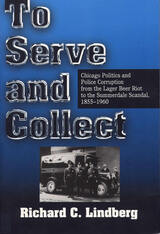
Crooked politicians, gangsters, madams, and cops on the take: To Serve and Collect tells the story of Chicago during its formative years through the history of its legendary police department.
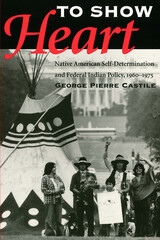
To Show Heart is a detailed and unbiased account of one of the least understood periods in Indian affairs. It tells how "termination" became a political embarrassment during the civil rights movement, how Lyndon Johnson's War on Poverty prompted politicians to rethink Indian policy, and how championing self-determination presented an opportunity for Presidents Nixon and Ford to "show heart" toward Native Americans. Along the way, Castile assesses the impact of the Indian activism of the 1960s and 1970s and offers an objective view of the American Indian Movement and the standoff at Wounded Knee. He also discusses the recent history of individual tribes, which gives greater meaning to decisions made at the national level. Castile's work greatly enhances our understanding of the formulation of current Indian policy and of the changes that have occurred since 1975. To Show Heart is an important book not only for anthropologists and historians but also for Native Americans themselves, who will benefit from this inside look at how bureaucrats have sought to determine their destinies.
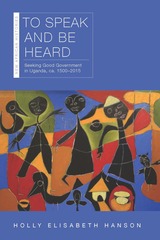
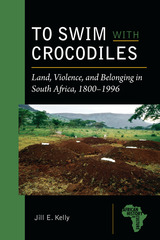

From Jason Lee’s first letter urging Congress to take possession of the Oregon Country to John Kitzhaber’s precedent-setting third term as governor, from the land frauds of the early 20th century to the state’s land-use planning goals, from the Beach Bill to the Bottle Bill, this book tells Oregon’s story.
Featuring interesting trivia, historical photographs, and biographical sketches of key politicians, To the Promised Land is an essential volume for readers interested in Oregon’s history.
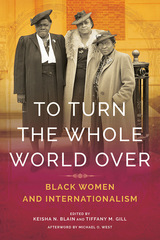

Why did the French Revolution lead to the crimes of the Terror, whereas the American Revolution brought forth a liberal democracy? Alexis de Tocqueville spent a lifetime trying to understand the paradox. This first book on the genesis of Tocqueville’s Democracy in America considers his two main themes of democracy and revolution in the light of his own early political activities and his subsequent studies of the past, and thereby makes a valuable contribution to intellectual history.
In tracing the evolution of Tocqueville’s work, Jean-Claude Lamberti reveals Tocqueville’s enormous intellectual debt to Montesquieu; skillfully analyzes all that separates Tocqueville from the liberal French school, particularly Benjamin Constant and François Guizot; shows that Tocqueville believed that the only means of preventing new revolutions (which he abhorred) was to increase political freedom, especially that of association; sketches the difference between Tocqueville and counter-revolutionaries on the question of individualism, which Tocqueville wished to correct but not annihilate. Never before have historians been able to place Tocqueville so securely in the genealogy of French liberalism. This new work demonstrates his relevance to the world today.

Every president faces criticism and caricature. Donald Trump, however, is unique in that he is routinely characterized in ways more suitable for a toddler. What’s more, it is not just Democrats, pundits, or protestors who compare the president to a child; Trump’s staffers, subordinates, and allies on Capitol Hill also describe Trump like a small, badly behaved preschooler.
In April 2017, Daniel W. Drezner began curating every example he could find of a Trump ally describing the president like a toddler. So far, he’s collected more than one thousand tweets—a rate of more than one a day. In The Toddler-in-Chief, Drezner draws on these examples to take readers through the different dimensions of Trump’s infantile behavior, from temper tantrums to poor impulse control to the possibility that the President has had too much screen time. How much damage can really be done by a giant man-baby? Quite a lot, Drezner argues, due to the winnowing away of presidential checks and balances over the past fifty years. In these pages, Drezner follows his theme—the specific ways in which sharing some of the traits of a toddler makes a person ill-suited to the presidency—to show the lasting, deleterious impact the Trump administration will have on American foreign policy and democracy.
The “adults in the room” may not be able to rein in Trump’s toddler-like behavior, but, with the 2020 election fast approaching, the American people can think about whether they want the most powerful office turned into a poorly run political day care facility. Drezner exhorts us to elect a commander-in-chief, not a toddler-in-chief. And along the way, he shows how we must rethink the terrifying powers we have given the presidency.

"An engaging account of the Toledo War of 1835, a serious confrontation whose outcome established the borders of the state of Michigan. Faber expertly narrates the history of a dispute conducted by fascinating characters practicing political shenanigans of the highest order."
---Andrew Cayton, author of Ohio: The History of a People and a general editor of The American Midwest: An Interpretive Encyclopedia
Most are familiar with the Michigan-Ohio football rivalry, an intense but usually good-natured contest that stretches back over one hundred years. Yet far fewer may know that in the early nineteenth century Michigan and Ohio were locked in a different kind of battle---one that began before Michigan became a state.
The conflict started with a long-simmering dispute over a narrow wedge of land called the Toledo Strip. Early maps were famously imprecise, adding to the uncertainty of the true boundary between the states. When Ohio claimed to the mouth of the Maumee River, land that according to the Northwest Ordinance of 1787 fell in the territory of Michigan, the "Toledo War" began.
Today the fight may bring a smile to Michiganians and Ohioans because both states benefited: Ohioans won the war and Michigan got the Upper Peninsula. But back then passions about rightful ownership ran high, and it would take many years---and colorful personalities all the way up to presidents---to settle the dispute. The Toledo War: The First Michigan-Ohio Rivalry gives a well-researched and fascinating account of the famous war.
Don Faber is best known as the former editor of the Ann Arbor News. He also served on the staff of the Michigan Constitutional Convention, won a Ford Foundation Fellowship to work in the Michigan Senate, and was a speechwriter for Michigan governor George Romney. Now retired, Faber lives in Ann Arbor with his wife, Jeannette, and indulges in his love of Michigan history.
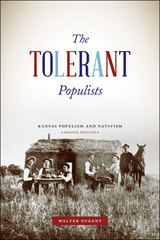
Historians wrote approvingly of the Populists up into the 1950s. But with time and new voices, led by historian Richard Hofstadter, the Populists were denigrated, depicted as demagogic, conspiratorial, and even anti-Semitic.
In a landmark study, Walter Nugent set out to uncover the truth of populism, focusing on the most prominent Populist state, Kansas. He focused on primary sources, looking at the small towns and farmers that were the foundation of the movement. The result, The Tolerant Populists, was the first book-length, source-based analysis of the Populists. Nugent’s work sparked a movement to undo the historical revisionism and ultimately found itself at the center of a controversy that has been called “one of the bloodiest episodes in American historiography.”
This timely re-release of The Tolerant Populists comes as the term finds new currency—and new scorn—in modern politics. A definitive work on populism, it serves as a vivid example of the potential that political movements and popular opinion can have to change history and affect our future.
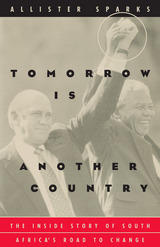
"A gripping, fast-paced, authoritative account of the long and mostly secret negotiations that brought South Africa's bitter conflict to its near-miraculous end. Sparks's description of these talks sometimes brings a lump to one's throat. He shows how the participants' deep mutual suspicion was gradually replaced by excitement at the prospect of making a momentous agreement—and also by the dawning realization that the people on the other side were human beings, perhaps even decent human beings."—Adam Hochschild, New York Times Book Review
"A splendid and original history. . . . Sparks's skillful weaving of myriad strands—Mandela's secret sessions with the committee, the clandestine talks in England between the African National Congress and the government, the back-channel communications between Mandela and the A.N.C. in exile, the trepidation of Botha and the apparent transformation of his successor, De Klerk—possesses the drama and intrigue of a diplomatic whodunit."—Richard Stengel, Time
"Sparks offers many reasons for hope, but the most profound of them is the story this book tells."—Jacob Weisberg, Washington Post
"The most riveting of the many [accounts] that have been published about the end of apartheid."—The Economist

The Pendergast machine rose to power riding the industrial and business boom of the 1920s, strengthened its grip during the chaos of the depression years, and grew fat and arrogant during the spending spree that followed. It fell apart in a fantastic series of crimes, including voting fraud and tax evasion, that shocked the nation and resulted in the incarceration of Tom Pendergast in a federal prison in 1939. Now available in paperback with a foreword by Charles Glaab, William M. Reddig's political and social history of Kansas City from the mid-1800s to 1945, focusing on the lives of Alderman Jim Pendergast and especially his younger sibling, Big Tom Pendergast, chronicles both the influence of the brothers on the growing metropolitan area and the national phenomenon of bossism.
"The story of the Pendergasts has been told ... in many places and in many ways. It has hardly been told anywhere, however, with more fascinating detail and healthy irony than in this volume of William M. Reddig." --New York Times
"Reddig has written his history of the Pendergast machine in a reportorial style which manages to combine plain city desk prose with a great deal of humor, irony, and insight. He has dwelt with obvious delight on the local characters, the factions, and feuds, and has given several brilliant personality sketches." --Saturday Review of Literature

Winner, A Choice Outstanding Academic Book
From 1964 until 1985, Brazil was ruled by a military regime that sanctioned the systematic use of torture in dealing with its political opponents. The catalog of what went on during that grim period was originally published in Portuguese as Brasil: Nunca Mais (Brazil: Never Again) in 1985.
The volume was based on the official documentation kept by the very military that perpetrated the horrific acts. These extensive documents include military court proceedings of actual trials, secretly photocopied by lawyers associated with the Catholic Church and analyzed by a team of researchers. Their daring project—known as BNM for Brasil: Nunca Mais—compiled more than 2,700 pages of testimony by political prisoners documenting close to three hundred forms of torture.
The BNM project proves conclusively that torture was an essential part of the military justice system and that judicial authorities were clearly aware of the use of torture to extract confessions. Still, it took more than a decade after the publication of Brasil: Nunca Mais for the armed forces to admit publicly that such torture had ever taken place. Torture in Brazil, the English version of the book re-edited here, serves as a timely reminder of the role of Brazil's military in past repression.
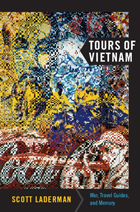
Tracing a history of ideological assertions embedded in travel discourse, Laderman analyzes the use of tourism in the Republic of Vietnam as a form of Cold War cultural diplomacy by a fledgling state that, according to one pamphlet published by the Vietnamese tourism authorities, was joining the “family of free nations.” He chronicles the evolution of the Defense Department pocket guides to Vietnam, the first of which, published in 1963, promoted military service in Southeast Asia by touting the exciting opportunities offered by Vietnam to sightsee, swim, hunt, and water-ski. Laderman points out that, despite historians’ ongoing and well-documented uncertainty about the facts of the 1968 “Hue Massacre” during the National Liberation Front’s occupation of the former imperial capital, the incident often appears in English-language guidebooks as a settled narrative of revolutionary Vietnamese atrocity. And turning to the War Remnants Museum in Ho Chi Minh City, he notes that, while most contemporary accounts concede that the United States perpetrated gruesome acts of violence in Vietnam, many tourists and travel writers still dismiss the museum’s display of that record as little more than “propaganda.”
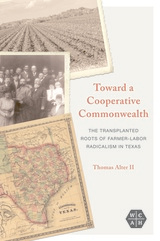
A rare look at the German roots of radicalism in Texas, Toward a Cooperative Commonwealth illuminates the labor movements and populist ideas that changed the nation’s course at a pivotal time in its history.

After the election, many Malaysians were optimistic about the possibility of a more representative, accountable, participatory, and equitable polity, but Meredith L. Weiss and Faisal S. Hazis do not see GE14 as a clear harbinger of full-on liberalization. While the political aftermath of the election continues to play out, the authors provide a clarion call for deeper, more critical, more comparative research on Malaysia’s politics. They upend commonly held beliefs about Malaysian politics and bring forward lesser-known theories, and they suggest agendas for empirically interesting, theoretically relevant further research. They also point to the broader insights Malaysia’s experience provides for the study of elections and political change in one-party dominant states around the world.

This collection presents a representative sample of the writings of three of the six Jesuits who were slain in El Salvador on November 16, 1989. Although little known in the United States, these men were significant scholars who possessed an original conception of the university. They affirmed in difficult circumstances, the pursuit and teaching of truth as a collaborative, collegial process that transcends international boundaries.

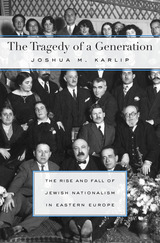
The Tragedy of a Generation is the story of the rise and fall of an ideal: an autonomous Jewish nation in Europe. It traces the origins of two influential but overlooked strains of Jewish thought—Yiddishism and Diaspora Nationalism—and documents the waning hopes and painful reassessments of their leading representatives against the rising tide of Nazism and, later, the Holocaust.
Joshua M. Karlip presents three figures—Elias Tcherikower, Yisroel Efroikin, and Zelig Kalmanovitch—seen through the lens of Imperial Russia on the brink of revolution. Leaders in the struggle for recognition of the Jewish people as a national entity, these men would prove instrumental in formulating the politics of Diaspora Nationalism, a middle path that rejected both the Zionist emphasis on Palestine and the Marxist faith in class struggle. Closely allied with this ideology was Yiddishism, a movement whose adherents envisioned the Yiddish language and culture, not religious tradition, as the unifying force of Jewish identity.
We follow Tcherikower, Efroikin, and Kalmanovitch as they navigate the tumultuous early decades of the twentieth century in pursuit of a Jewish national renaissance in Eastern Europe. Correcting the misconception of Yiddishism as a radically secular movement, Karlip uncovers surprising confluences between Judaism and the avowedly nonreligious forms of Jewish nationalism. An essential contribution to Jewish historiography, The Tragedy of a Generation is a probing and poignant chronicle of lives shaped by ideological conviction and tested to the limits by historical crisis.

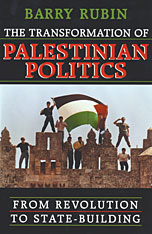
This book is a comprehensive overview and analysis of the Palestinians’ travail as they move from revolutionary movement to state. Barry Rubin outlines the difficulties in the transition now underway arising from Palestinian history, society, and diplomatic agreements. He writes about the search for a national identity, the choice of an economic system, and the structure of government.
Rubin finds the political system interestingly distinctive—it appears to be a pluralist dictatorship. There are free elections, multiple parties, and some latitude in civil liberties. Yet there is a relatively unrestrained chief executive and arbitrariness in applying the law because of restraints on freedom. The new ruling elite is a complex mixture of veteran revolutionaries, heirs to large and wealthy families, professional soldiers, technocrats, and Islamic clerics. Beyond explaining how the executive and legislative branches work, Rubin factors in the role of public opinion in the peace process, the place of nongovernmental institutions, opposition movements, and the Palestinian Authority’s foreign relations—including Palestinian views and interactions with the Arab world, Israel, and the United States.
This book is drawn from documents in Arabic, Hebrew, and English, as well as interviews and direct observations. Rubin finds that, overall, the positive aspects of the Palestinian Authority outweigh the negative, and he foresees the establishment of a Palestinian state. His charting of the triumphs and difficulties of this state-in-the-making helps predict and explain future dramatic developments in the Middle East.
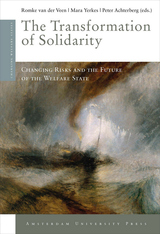

The Transformation of the Christian Right chronicles and analyzes the remarkable changes that have occurred in the Christian Right from its emergence in the late 1970s to the present. It documents the rapid turnover of Christian-Right organizations and explains the forces driving that kaleidoscopic change. Moen also traces the strategic shift of the movement’s leaders, away from lobbying the Congress and toward mobilizing conservative activists in the grass roots; he demonstrates the substitution of liberal language (with its emphasis on “equality, rights, and freedom”) for moralistic language (with its focus on “right and wrong”). Much has been written about the Christian Right’s impact on politics but little about how years of political activism have shaped and influenced the Christian Right. Moen addresses that neglected side of the issue.

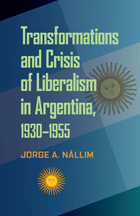
Hipólito Yrigoyen and the deposing of Juan Perón in 1955. While historians have primarily focused on liberalism in economic or political contexts, Nállim instead documents a wide range of locations where liberalism was claimed and ultimately marginalized in the pursuit of individual agendas.
Nállim shows how concepts of liberalism were espoused by various groups who “invented traditions” to legitimatize their methods of political, religious, class, intellectual, or cultural hegemony. In these deeply fractured and corrupt processes, liberalism lost political favor and alienated the public. These events also set the table for Peronism and stifled the future of progressive liberalism in Argentina.
Nállim describes the main political parties of the period and deconstructs their liberal discourses. He also examines major cultural institutions and shows how each attached liberalism to their cause.
Nállim compares and contrasts the events in Argentina to those in other Latin American nations and reveals their links to international developments. While critics have positioned the rhetoric of liberalism during this period as one of decadence or irrelevance, Nállim instead shows it to be a vital and complex factor in the metamorphosis of modern history in Argentina and Latin America as well.
READERS
Browse our collection.
PUBLISHERS
See BiblioVault's publisher services.
STUDENT SERVICES
Files for college accessibility offices.
UChicago Accessibility Resources
home | accessibility | search | about | contact us
BiblioVault ® 2001 - 2024
The University of Chicago Press









